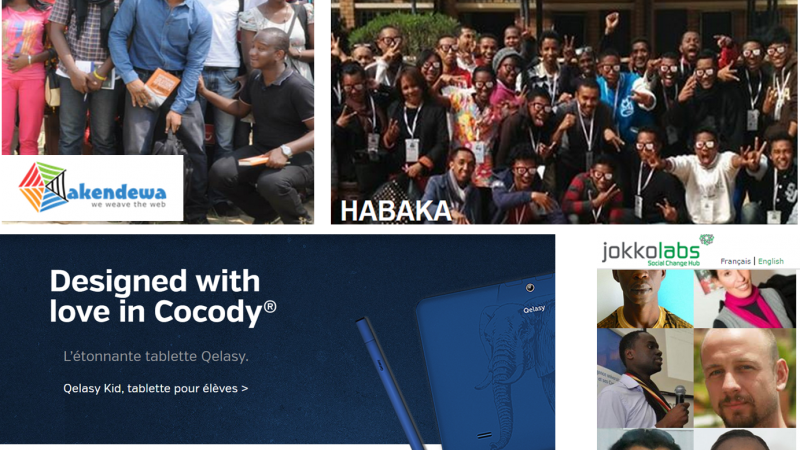
Four tech communities that are blossoming in Africa: Akendewa CIV, Habaka, Mg; Qelasy, CIV; JokkoLabs, SEN)
In recent years, stories of an “African technological renaissance” and extraordinary promises of the “Silicon Savannah” and other technology centres in Sub-Saharan Africa have been abundant in the media. The hype reached its climax during US President Barack Obama’s visit to the Global Entrepreneurship Forum in Nairobi.
Francophone Africa had been remarkably absent from this media coverage, with the eyes of the world focusing largely on the prominent Anglophone countries such as Nigeria, Kenya, South Africa, and Ghana. So, out of the 30 best performing start-ups that will be competing in the next competition, DEMO Africa, only three are from French-speaking countries: two from Cameroon (which is also half Anglophone) and one from the Côte d'Ivoire.
There is a general consensus that the technology sectors in Sub-Saharan French-speaking Africa are lagging considerably behind their Anglophone counterparts. However, technology in Francophone Africa seems ready to rise to the challenge with the emergence of promising new projects in tech innovation.
Some indications of the potential sources of the problem include the fact that Francophone entrepreneurs are still limited to a greater extent by their lack of financing than their English-speaking counterparts. The majority of the providers of financial capital are Anglo-Saxon investors, who are more reluctant to invest in French-speaking Africa and are less likely to know about its start-ups. In fact, by comparison to English-speaking countries, French-speaking Africa is practically devoid of the needed investors to really jump start tech incubators. Here is a map of all the startup incubators, IT Hubs, co-working spaces and IT Labs on the African continent:
Despite these obstacles, things are starting to change, and Senegal is pioneering in starting up numerous IT businesses. Jokkolabs is one of the first co-working space in French-speaking Sub-Saharan Africa; it first opened its doors in Dakar in 2010. Since then, with business incubators CTIC Dakar showing the way, tech communities have gone on to organise a series of hackathons, training courses (#Codecamp), and some conferences (such as #Failcon #Dakar last month). Jokkolabs is now sharing its model throughout West Africa with open branches in the Côte d'Ivoire, Burkina Faso, Mali, and Benin, and will soon be in Morocco. In 2012, Senegal became the first French-speaking African country to hold a start-ups conference.
However, Côte d'Ivoire could be about to overtake Senegal on the technology front. The first tech hub, Akendewa, was launched in 2009 and remained active throughout the financial crisis of 2010-2011. The country has also produced promising start-ups, like Qelasy (an educational tablet for children) and TaxiTracker (a geolocation application to address the worries surrounding the security of Ivorian taxis), that address the specific problems faced by the Ivorians.
Neighbouring country Togo has also stood out in the African “Maker” movement thanks to its most well known “fab lab” (a fabrication laboratory equipped with flexible computer controlled tools with the aim to make “almost anything”) the Woe Lab, and the launching of a new fab lab in the north of the country earlier this year. The Woe Lab is most known for its pioneer 3D Printer project made from E-Waste. .
The first Niger incubator, CIPMEN, was created with the financial backing of French telecommunications giant Orange.
But tech dynamism is not limited to West Africa. Start-up VMK, in the Republic of the Congo (Brazzaville), had launched the first African smartphone and tablet a few years ago (sold in the Congo and Côte d'Ivoire) and opened its first manufacturing plant for these devices on the 22 July in Brazzaville. Founder and chief executive of VMK, Verone Mankou, also founded BantuHub, a non-profit tech hub, and the start-up incubator in Bazzaville.
Close by, Cameroon also has the non-profit bilingual hub ActivSpaces, the country’s first start-up accelerator that finished its first start-ups class in June.
Habaka stands out in Madagascar for its multiple projects on the innovation front and its support of digital educational projects. This project was created in 2011 and was originally initiated by independent stakeholders of the Association of Malagasy IT Developpers (bloggers and independent workers in new technologies.) The following video presents the projects taking part in the TEDx event in the country’s capital, Antananarivo.
All of these technology incubator centres in French-speaking Sub-Saharan Africa are encouraging, but examples of dazzling start-up success are still limited. Furthermore, a large number of the region’s start-ups are financed by non-profit organisations or governments, but not private investors (with the exception of Senegal, which with the recent creation of Teranga Capital, a social venture capital firm that is financed by the private sector to provide start-up financing for small businesses).
And while the tech entrepreneurship couldn’t contribute significantly as a sector to the economic growth of French-speaking countries in Africa, it has the potential all the same to produce local innovations that would be able to improve the day-to-day lives of the citizens in this continent.








3 comments